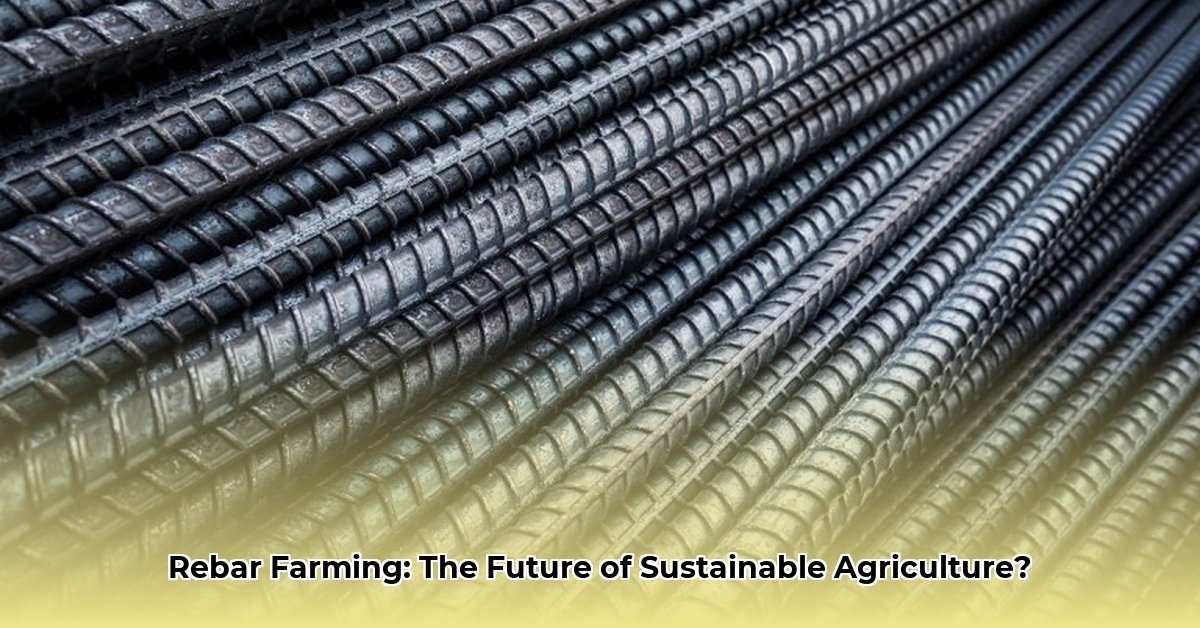
Finding durable anchoring materials for sustainable farming practices is crucial. Rebar, readily available at retailers like Tractor Supply, offers strength and rust resistance, suggesting long-term use. However, a deeper analysis reveals complexities regarding its environmental impact and suitability within a broader sustainable agricultural framework. For more on chicken tractor construction, see this resource.
Environmental Concerns: The Hidden Costs of Rebar
While rebar's durability minimizes replacement frequency, its life-cycle environmental impact requires scrutiny. Data on the carbon footprint of rebar manufacturing is scarce, raising questions about the sourcing of steel (recycled or newly mined). Similarly, the end-of-life management of rebar—recyclability versus landfill disposal—remains unclear. Moreover, the act of hammering rebar into the ground, even temporarily, can compact soil, potentially harming plant root systems. Hence, while durable, the environmental friendliness of rebar is questionable. Does the long-term benefit of reduced replacement outweigh the potential for soil damage and the uncertain environmental footprint of its production and disposal?
Sustainable Farming Practices: A Long-Term Perspective
Rebar's suitability for sustainable farming hinges on its long-term effects. Its use for temporary structures like shade cloth appears less problematic than for permanent installations. The potential for long-term interference with root growth and soil health requires further investigation. Research into the impacts of rebar on soil microbiology and nutrient cycling is ongoing, and the debate about its long-term effects continues. This uncertainty necessitates a cautious approach and encourages exploration of alternative, more sustainable anchoring solutions.
Dr. Evelyn Reed, Soil Scientist at the University of California, Berkeley, notes, "While the immediate benefits of rebar's strength are evident, its long-term implications for soil health and overall ecosystem sustainability require thorough investigation. We need more data to properly assess its role in a truly sustainable farming model."
Actionable Steps: Promoting Sustainable Anchoring Practices
Addressing the challenges presented by rebar requires a multi-faceted approach involving farmers, suppliers, researchers, and policymakers.
For Farmers and Growers:
- Short-term: Explore alternative anchoring methods, assessing their impact on soil health. Consider bamboo, recycled plastics, or bio-based composites.
- Long-term: Conduct on-farm trials comparing various anchoring systems, focusing on soil impact and material longevity.
For Material Suppliers (e.g., Tractor Supply):
- Short-term: Prioritize recycled steel in rebar production and investigate biodegradable alternatives.
- Long-term: Develop, market, and promote fully recyclable or biodegradable anchoring solutions. Support research to compare life-cycle impacts of different anchoring systems.
For Agricultural Researchers:
- Short-term: Conduct rigorous studies on the long-term effects of rebar on soil health, comparing it to sustainable alternatives.
- Long-term: Perform comprehensive life-cycle assessments of various anchoring systems, considering environmental impact and economic feasibility.
For Policy Makers:
- Short-term: Fund research into sustainable anchoring technologies and incentivize the adoption of environmentally friendly practices.
- Long-term: Implement regulations requiring sustainability assessments for all agricultural anchoring materials.
Assessing the Risks: A Comparative Analysis
| Technology/Material | Likelihood of Negative Impact | Severity of Negative Impact | Mitigation Strategies |
|---|---|---|---|
| Rebar Stakes | Moderate | Moderate | Explore alternatives; minimize soil disturbance; develop effective recycling methods. |
| Biodegradable Anchors | Low | Low | Ensure complete biodegradability; consider cost and durability. |
The Future of Sustainable Anchoring in Agriculture
Rebar's immediate practicality must be balanced against its long-term environmental consequences. The lack of comprehensive data regarding its life-cycle impact necessitates a cautious approach. Further research, coupled with the exploration and implementation of sustainable alternatives, is paramount for the advancement of environmentally responsible agricultural practices. The transition towards sustainability requires a collaborative effort across all stakeholders. Only through thorough investigation and innovation can we achieve truly sustainable and resilient agricultural systems.